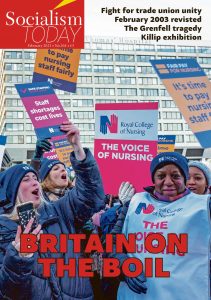
Rising strike action and economic and political crises are central features of the situation in Britain as we enter 2023. How do we see these processes developing in the period ahead? Below Socialism Today prints the draft British Perspectives document written for debate at the Socialist Party’s national congress in February, which addresses these and other vital issues for the class struggle today.
The background to the 2023 national congress is economic crisis, a weak government and, above all, dramatically intensified class struggle. In December 2022 an estimated 1.5 million days were lost to strike action, the highest level for over thirty years. As January 2023 opens, the strike wave is continuing to escalate. It has widespread popular support.
What, however, are the prospects for class struggle beyond the immediate period? As this statement elaborates, the as yet uncertain outcome of the current strikes will be an important factor shaping future developments. But regardless of the results of these battles, we are at the beginning of a new period of increased working-class combativity.
Clear successes for the trade unions in the present disputes would partially relieve the desperate of cost-of-living squeeze and enormously strengthen the confidence of the working class for inevitable future battles. On the other side, even if the current wave of struggle does not lead to clear victories for workers, or if defeats are suffered, it will not prevent new conflicts erupting. The current strike movement marks a turning point, a decisive departure from the previous period of prolonged low levels of struggle.
Read more